News
-
31.10.2024

Residents enjoy living in areas with a bad reputation better than expected
An extensive interview study in Sweden, Finland and Denmark gives a voice to residents of disadvantaged neighbourhoods.
In the Future Challenges in the Nordics research project ”The Future of Diverse and Disadvantaged Neighbourhoods in the Nordic Welfare States — The Voices of Residents”, researchers from four Nordic universities are studying six neighbourhoods with a bad reputation in Finland, Sweden and Denmark. In Helsinki and Vantaa in Finland, Kontula and Koivukylä are studied, in Gothenburg in Sweden, Biskopsgården and Hammarkullen are studied, and in Aarhus in Denmark, Herredsvang and Gellerup are studied. All neighbourhoods are associated with at least some negative perceptions and the proportion of immigrants is higher than average in the studied cities.
The researchers are interviewing a total of around 4 800 people whose voices are not usually heard in public debate. The interviews focus on how residents perceive their neighbourhood, how they feel about it, how they relate to society in general, and whether they experience discrimination because of where they live.
“Disadvantaged areas are a highly politicised topic, especially in Sweden and Denmark,” says Peter Esaiasson, Professor in Political Science at the University of Gothenburg, who is leading the research project.
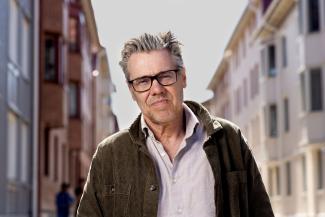
Peter Esaiasson. Image: Johan Wingborg/University of Gothenburg The research is based on extensive and long-term fieldwork, which has given the researchers a diverse picture of the areas and the residents. Interviews have been conducted both in residents' homes and in public places.
“It has been surprisingly easy to find interviewees and the fieldwork has also allowed us to reach the less educated population more than usual. The interview guide has been translated into Russian, Somali, Arabic, Swedish, Finnish, Danish and English. Sometimes family members or neighbours have acted as interpreters if the interviewer and the interviewee did not have a common language,” says Esaisson.
Residents are satisfied
The preliminary results of the research show that residents' trust in the community is not significantly lower in the surveyed neighbourhoods compared to other areas. However, many people are bothered by the stigmatisation of the neighbourhoods.
“In general, people enjoy living in the surveyed neighbourhoods, especially if they belong to the majority group. Many people know that the neighbourhood has a bad reputation, but this does not correspond to their own experiences as residents,” says Esaiasson.
There are both similarities and differences among the areas surveyed. In Finland, the areas do not differ as much from other neighbourhoods as in Denmark and Sweden.
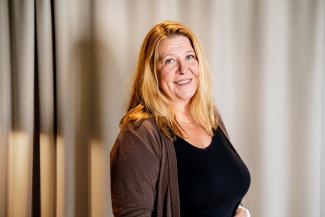
Mari Vaattovaara. Image: Mathias Foster/Futurenordics “In Kontula and Koivukylä, trust in society and authorities was high and did not differ much from the national average,” says Mari Vaattovaara, Professor in Urban Geography at the University of Helsinki.
The final results of the project will be published in 2026.
More information:
Professor Peter Esaiasson
University of Gothenburg
peter.esaiasson@pol.gu.se
+46 31 786 12 22
+46 733 52 36 12
Mari Vaattovaara
University of Helsinki
mari.vaattovaara@helsinki.fi
+358 50 415 4861 -
18.10.2024

People over 75 face significant challenges as health services go digital
A project within the Future Challenges in the Nordics research programme highlights the concrete challenges that older people face when using digital health services. The digitalisation of care work is also changing the job description of professionals, and there isn’t necessarily any training available for this.
The research project "Demography and Democracy – Healthy Ageing in a Digital World (HAIDI)" examines the digitalisation of social and health services in three Nordic countries from the perspective of the ageing population. The aim is to find out whether citizens' equal rights and opportunities to good health are being realised in a context where services and society are largely digitalised.
Data has been collected through interviews with people aged 75 and over about their experiences of using digital health services. In Finland the study focuses on people living at home, in Denmark on people living in nursing homes and in Sweden on older people in both groups. The survey will bring to the fore experiences and voices that are not usually heard in the social debate.
"In all three countries surveyed, older people are encouraged to take responsibility for their own health. However, there are differences in the stage each country is at in the digitalisation of social and health services," say Elisa Tiilikainen, Associate Professor at the University of Eastern Finland, and Hanna Varjakoski, Postdoctoral Researcher at the University of Eastern Finland.
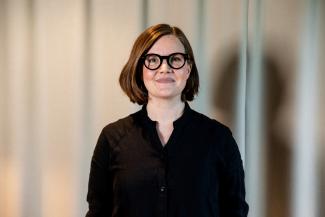
Elisa Tiilikainen. Photo: Mathias Foster/Futurenordics 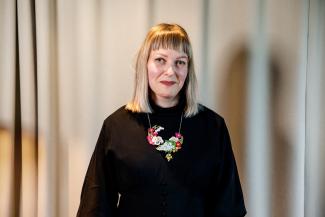
Hanna Varjakoski. Photo: Mathias Foster/Futurenordics Digital services need to be personalised
In policy-making, digital services are strongly associated with the assumption that they improve accessibility and involve citizens in monitoring and managing their own health. However, the results of the project show that there are many challenges in using digital health services from the perspective of an ageing population.
Interviews revealed that even when older people have the basic skills to use other digital services, the digital health services cause problems.
"Public health websites are often perceived as poorly designed and difficult to use. Many people find it difficult to find them," say Tiilikainen and Varjakoski.
In addition, many older people are used to face-to-face interactions and find digital services remote and impersonal. Digital services also often lack real-time communication. Researchers argue that digital health services should be designed from the outset with the user in mind, including specific needs related to ageing and functional capacity.
Digitalisation is changing the way care works
Care professionals working with older people have also faced challenges as services become digital.
"It has been surprising to find that, for example, there is not necessarily any training on how to do remote home care. Digital care has changed the nature of work significantly and it is important that it is also taken into account in the training of professionals," Varjakoski and Tiilikainen say.
According to the study, the design of public digital services is lagging behind private services. Poor service design affects the user experience and reduces the willingness to reuse services.
"If we want to increase the use of digital services, their accessibility and usability should be significantly improved," Varjakoski and Tiilikainen say.
A total of 71 elderly people and 39 professionals working in social services for the elderly in Finland, Sweden and Denmark were interviewed for the study. The final results will be published in 2025.
More information:
Elisa Tiilikainen, Associate Professor
University of Eastern Finland
elisa.tiilikainen@uef.fi
+358 50 413 4680Hanna Varjakoski, Postdoctoral Researcher
University of Eastern Finland
hanna.varjakoski@uef.fi
+358 50 304 1194 -
13.12.2021
From digital border control to a new wealth elite – eleven projects have been selected by the research programme Future Challenges in the Nordics
Eleven projects have been selected for funding as part of the research programme, Future Challenges in the Nordics – People, Culture and Society. The projects represent everything from digital health and law to climate research and cultural studies. The total amount of financing is about 10.5 million euros.
Future Challenges in the Nordics is a seven-year research programme that stimulates research within humanities and social sciences in the Nordics. The programme focuses on the large societal challenges of the 21st century and how those challenges are understood and handled within the Nordic societies. During the spring, the programme received 449 applications for funding and now the final selection of 11 applications has been made.
The research programme emphasises multidisciplinarity and cooperation across national borders in the Nordics. Researchers from Finland, Sweden, Norway and Denmark will participate in the 11 selected projects, and around 30 research disciplines will be represented. Tom Moring, the chairman of the programme’s steering group, is very satisfied with the projects that are financed.
“The chosen projects are multidisciplinary and they combine social sciences and humanities in a new way. They also have a clear relevance for society and represent a wide range of research disciplines. The interest in the programme among researchers was great and the applications were of such a high quality that all of the financiers chose to increase their original funding. In the last stretch of the application process we also welcomed a new financier, the Kamprad Family Foundation.”
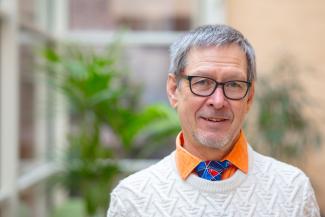
Tom Moring. Image: Janne Rentola/SLS The research programme is funded by the Finnish foundations The Society of Swedish Literature in Finland, The Swedish Cultural Foundation in Finland, The Finnish Cultural Foundation and Stiftelsen Brita Maria Renlunds minne. In Sweden, Riksbankens Jubileumsfond and The Kamprad Family Foundation are funders. The aim of Future Challenges in the Nordics is for scientifically sophisticated research undertaken under the auspices of the programme to also concretely benefit society.
-
2.12.2021
The Kamprad Family Foundation for Entrepreneurship, Research & Charity will join as a funder in Future Challenges in the Nordics
The research programme Future Challenges in the Nordics – People, Culture and Society is getting a sixth funder as The Kamprad Family Foundation for Entrepreneurship, Research & Charity from Sweden joins. The programme will finance research related to the great societal challenges of our time. All programme funders have decided to increase their financial contributions and total funding now stands at about 10.5 million euros.
Future Challenges in the Nordics is a seven-year programme for research within humanities and social sciences in areas that pose major social and cultural challenges. The programme’s main goal is to stimulate research across national and disciplinary boundaries and produce results that will concretely benefit society.
Finnish foundations that are providing funding for the programme are The Society of Swedish Literature in Finland, The Swedish Cultural Foundation in Finland, The Finnish Cultural Foundation, and Stiftelsen Brita Maria Renlunds minne. In Sweden, Riksbankens Jubileumsfond and now The Kamprad Family Foundation.
“We are happy to participate in the research programme, Future Challenges in the Nordics. Together, we can help support research that can make a difference by providing knowledge to society and value for citizens and policymakers, while strengthening cooperation among funders in the Nordics,” says Lena Fritzén, Executive Board Member for The Kamprad Family Foundation.
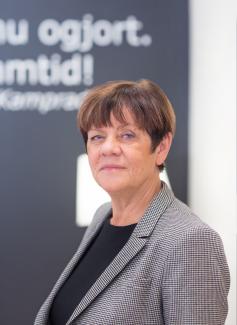
Lena Fritzén, Executive Board Member for The Kamprad Family Foundation. The Kamprad Family Foundation was founded in 2011 by Ingvar Kamprad and his family to support, stimulate and reward education and scientific research to promote entrepreneurship, the environment, skills, health and social development. The foundation puts a heavy emphasis on the belief that the results of research and education should benefit many people quickly and cost-efficiently.
“We welcome The Kamprad Family Foundation as a funder of the research programme with joy and pride,” says Christer Kuvaja, coordinator of the research programme and Head of Research at the Society of Swedish Literature in Finland. “The fact that we have a new financial contributor and that the other funders want to raise their contributions shows that the research we will conduct within the programme is of a high quality and also necessary.”
The research programme was originally going to fund 6–10 projects with up to one million euros per project. After the application process during spring and summer, the financiers could see that there were so many high-quality applications among the 449 received that they wanted to raise the amount of funding. Now the total has reached about 10.5 million euros.
The projects that will receive financing within the research programme will be announced in the near future.
-
5.5.2021

Twenty-eight applications proceed to stage two
Future Challenges in the Nordics – People, Culture and Society received 449 applications in the first stage of the application process. Based on a shortlist drawn up by a panel of experts, the steering group of the programme has chosen 28 applications that will proceed to stage two.
The panel of experts reviewing the 449 applications consisted of professors and emeritus professors, appointed because of their broad expertise beyond their main subjects. The applications were distributed so that each panellist received about 90 applications to evaluate, and each application was evaluated by two experts.
The panel of experts selected 25 applications for an A-list and 26 applications for a B-list. The B-list was drawn up so that the steering group would have alternatives to the projects on the A-list. They would also be able to supplement the A-list with projects from the B-list if necessary.
“The panel of experts agreed that these were 51 high-quality applications. In addition to these, 25 more were discussed but not placed on either of the lists. Those applications were also very good,” said Christer Kuvaja, Head of Research at the Society of Swedish Literature in Finland and coordinator of the research programme.
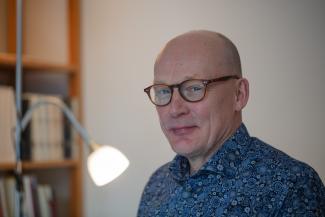
Head of Research Christer Kuvaja. Image: Janne Rentola/SLS. Of these applications, the panel of experts nominated the top 15 applications on the A-list, which were considered outstanding. On the B-list, the top eight applications were nominated.
Last week, the steering group, consisting of representatives of the programme’s financiers, met to choose which of the shortlisted projects would proceed to stage two of the application process.
“The steering group decided that all of the 25 applications on the A-list would proceed to stage two. They also decided that three of the top eight applications on the B-list would proceed. Thus, 28 applications in total moved on to the second stage.”
All of the proceeding applications were multidisciplinary. Sorted according to main field of research, nine represented political science or sociology, five law or ethics, five history, three communication and media, two pedagogy, two languages or literature, one economics and one ethnology.
The applications proceeding to stage two will submit a full application and project plan between 15th May and 18th June 2021. The full applications will again be evaluated by the panel of experts, which recommends projects for funding to the steering group. The steering group will present a final proposal to the funders of the research programme in September. The funders will make their funding decisions in October or November 2021. The projects can start in 2022.
-
23.2.2021
Future Challenges in the Nordics receives 449 applications

Head of Research Christer Kuvaja was pleasantly surprised by the amount of applications to Future Challenges in the Nordics. (Emma Tuominen/SLS) The first stage of the application process to the research programme Future Challenges in the Nordics – People, Culture and Society ended on February 15th. A total of 449 applications were submitted.
Of the applications, 262 came from Sweden and 187 from Finland, since the project leader must have an affiliation to a university, Higher Education Institution or a research institute in Sweden or Finland. However, all the Nordic countries were represented among the project group participants.
“We expected to receive 100–200 applications. It came as a pleasant surprise, both for me and for all the participating financiers, that as many as 449 applications were submitted,” said Christer Kuvaja, Head of Research.
According to Kuvaja, the large amount of applications indicates that future societal challenges in the Nordic region is a theme that engages many researchers and is important to study.
“Based on a quick review of all applications, questions about covid-19 and pandemics as well as the climate, AI, the elderly, children and young people, are the ones that dominate.”
Evaluation process
The programme’s steering group is currently reviewing the applications, in order to make sure that they fall within the purpose of the research programme. The approved applications will then be evaluated by a panel, which consists of external experts with a wide knowledge in culture and society.
“The key criteria for the assessment of the applications are the academic quality of the research content, the feasibility of the project, the potential benefit for society and the leadership-qualifications of the project leader,” explained Kuvaja.
The steering group will make the final decision on which 30 projects will continue to stage two, where they will submit a full application. The project leaders will be informed about the decisions by the end of April.
Stage two runs from May 5th to June 18th 2021.







